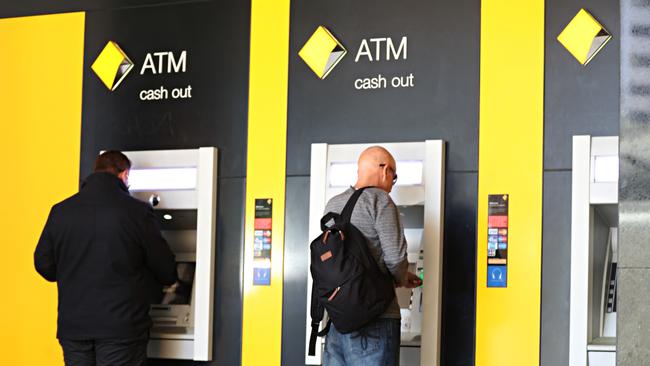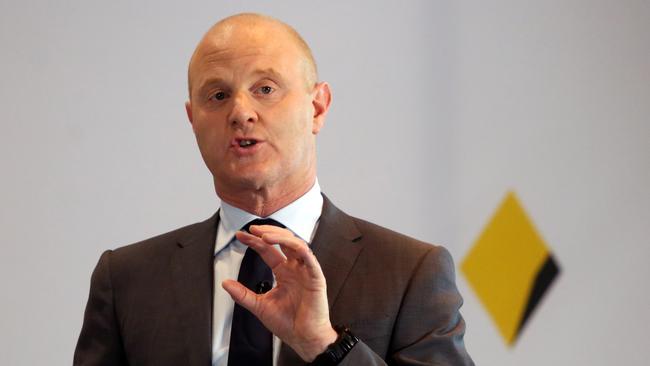
Already they have watched their CBA shares fall about 10 per cent since the Austrac announcement on August 3 of civil court action against the lender for alleged breaches of money-laundering and anti-terror financing laws. Shares in Australia’s second largest bank, Westpac, were almost steady over the same period.
Accordingly, on the basis of a comparison between CBA and Westpac shares, the market thinks that the combination of corporate damage and fines to CBA will be between $13b illion and $14 billion. That’s more than last year’s CBA $10 billion profit.
Markets like CBA shares are driven by fear of the unknown and are often wrong when the full facts are revealed--– but the error can go both ways.
If, theoretically, the CBA fines and damages (not the impact on the business) total more than one year’s profit or $10 billion then CBA shareholders not only lose out via the share price fall but will be forced to inject a major chunk of the loss back into the company via lower dividend and/or share issues so as to restore the bank’s capital ratios.
In other words it’s the shareholders rather than the directors and managers who pay the fines and damages.
There is something wrong with a system where this happens.
When the Austrac investigation was first announced Commonwealth Bank shares were just below $84. They immediately slumped but the CBA public relations machine put the message out that it was a systems failure and might even be considered one offence.
That held the shares above $80 until gradually it became apparent that the situation was considerably worse than the initial CBA message. Austrac had spent years working on the case and there was no way it would be regarded as one offence.
The shares then fell to the next support level — just above $75, or about 10 per cent below the level prior to the Austrac announcement.
Ahead of the CBA is not only the task of sorting through the 12,506 transactions linked to the automatic teller machines but also the 778,370 accounts being monitored.
And how much of the information on the extended Austrac investigation reached the CEO and the board.
These will be vital issues where the interests of certain CBA middle managers may be different to those at the top and to directors. But this is speculation because there are a lot of facts yet to come out as the warning signs are examined.
Those warning signs include the whistleblower who alerted CBA senior managers that they had a cultural problem in the technology department, albeit not a warning about money laundering; and a written report warning of problems and vulnerability of the large withdrawal automatic teller system.
The facts on these events and who held the knowledge will form part of the cultural inquiry by people appointed by APRA.
The question of what the board knew or should have known will also be covered by the ASIC investigation.
On top of that there is the event that started the crisis — the Austrac civil proceedings against the company. There is also the possibility of a shareholder action from the material produced from the above events. Most companies would regard any one of those events as a major crisis.
And that’s what has appeared in just a month. All these events will produce explanations as to what happened which may lead to clearance or alternatively more scandals and mistakes. And we will learn more about the people who were doing the money laundering and the terrorists who appear to have received some of the cash.
No one has seen the CBA defence so it is possible that the damages will be much less than the market fears. But on the basis of past events once a situation starts to go into reverse the trend continues. If that’s the way it turns out the departure of chief executive Ian Narev will be followed by other management casualties. All executives and staff will receive their contractual entitlements.

If it is shown that the board did not know about the problem there may be a board pruning because of lack of governance, but again no financial penalty. The situation would change if the board did know and did not tell shareholders. You would then see major shareholder damages actions, but against the CBA, so it’s shareholders who ultimately foot any bill.
On a personal basis, directors at the time of the $71.50 placement in 2015 will be particularly vulnerable if the shares fall below $71.50.
In capital raisings, directors have to make detailed statements on risks as part of the prospectus legislation.
Overall if there is a CBA fine and it is below $1 billion then it can be managed with limited damage to shareholders. But if the fines go anywhere near the fall in CBA shares then capital will need to be restored.
But the biggest danger might be that at a time of rapid change in banking, and many new challengers, the CBA becomes moribund by the management upheaval.
Clearly the $14 billion fall in market capitalisation includes an estimate of the both fines and the impact of the crisis on the company, but it’s a market guess. No one knows.







As the Commonwealth Bank money laundering-terror funding affair worsens, suddenly it becomes apparent that the innocents, CBA shareholders, are looming as the major victims.